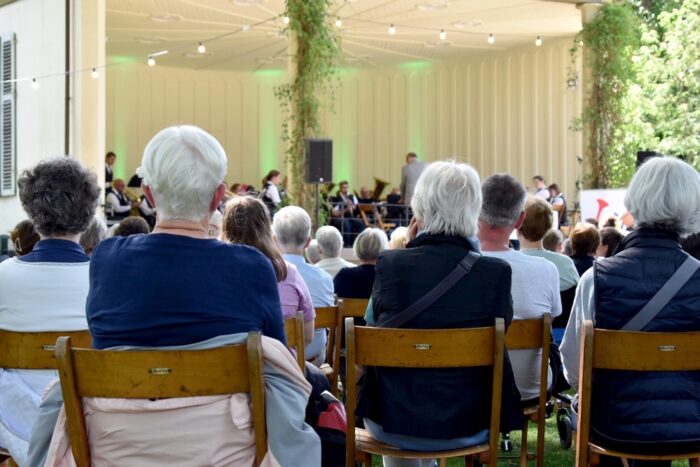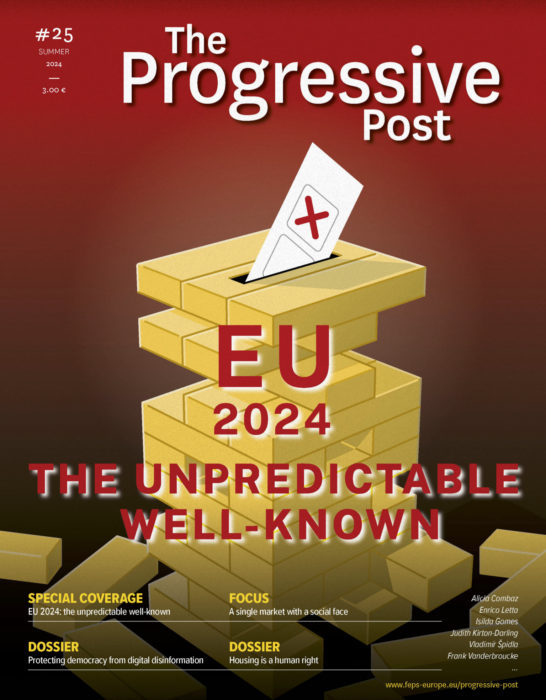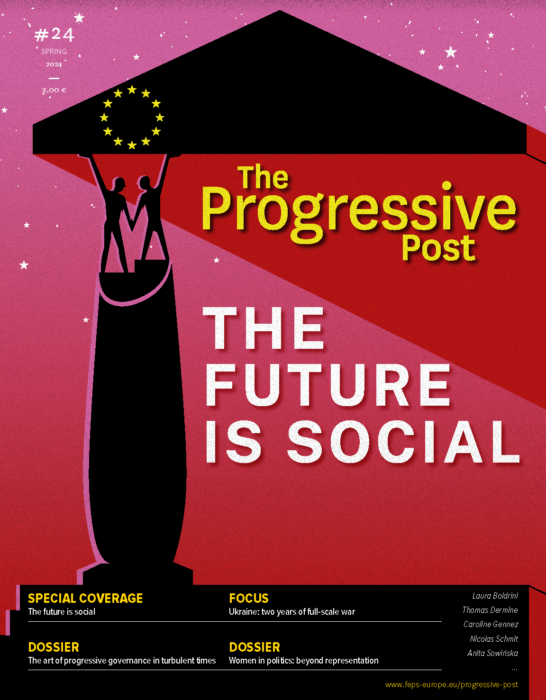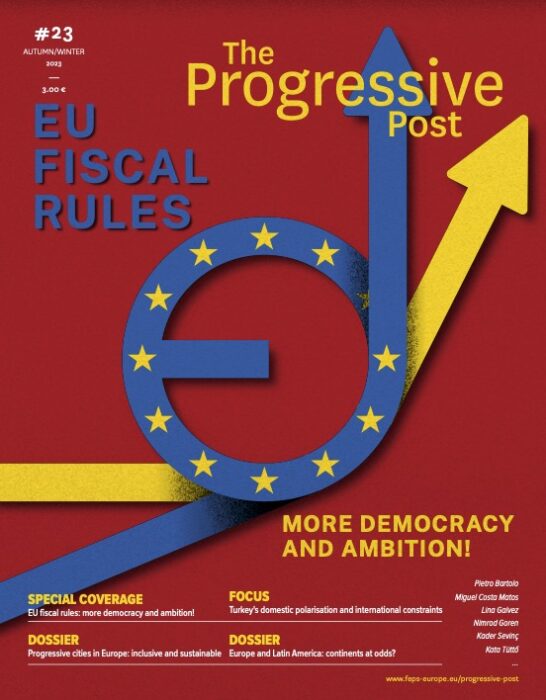
Professor of Public Policy at Queen Mary, University of London and a member of the FEPS Scientific Council
18/01/2017
Despite predictions of electoral disaster for the Labour Party before the UK
election, its leader Jeremy Corbyn managed to secure 40% of the popular
vote, its best performance since Tony Blair’s victories in 1997 and 2001. The
party’s campaign featured an effective use of social media, traditional door to
door canvassing and very successful open air political rallies. Labour’s
success showed that it can fight with traditionally left wing policies and that
it is possible to politically mobilise younger voters and the so-called ‘left behind’.
The result of the 2017 UK general election has astonished Britain’s most
experienced political observers. At the start of the campaign, most polling
experts and political scientists were predicting electoral disaster for Jeremy
Corbyn’s party: Labour was twenty points behind in the opinion polls having
been heavily defeated in recent local elections. In terms of ratings of political
leadership and economic competence, Corbyn trailed Theresa May by a huge
margin. However, on June 8th, Labour secured over 40 per cent of the popular vote, its
best performance since Tony Blair’s victories in 1997 and 2001. In just two
years, the party’s share of the vote increased by over 9 per cent, the largest
rise Labour has enjoyed since 1945. This is in stark contrast to most social
democratic parties in the advanced capitalist countries who are struggling to
arrest the decline in their national vote share.
In the meantime, May’s cataclysmic performance has plunged the
Conservative party into chaos, and potentially imperilled the entire Brexit
process. Increasingly, Corbyn is viewed as a prospective Prime Minister by
previously sceptical voters. This election has delivered a political earthquake
in the UK which appears, at least on the surface, to challenge a number of
orthodoxies that have prevailed in British political life for the last forty years.
The first and most obvious orthodoxy to be overturned is the claim that the
Labour party cannot succeed electorally by fighting from the Left. Labour’s
programme was not that far removed from traditional social democracy: it
promised to tax the better-off in order to fund the National Health Service
(NHS) and schools, as well as abolishing university tuition fees; the
manifesto pledged to nationalise failing privatised utilities such as the
railways and the energy sector. The party’s policies were unquestionably
further to the Left than at any election since 1983. Yet Labour increased its
share of the vote among most social groups. The contention of Labour
modernisers that Britain is an inherently Conservative country which is
resistant to higher taxes and more sceptical than ever of a ‘bigger state’ has
apparently been confounded.
The second orthodoxy apparently disproved by Labour’s performance is the
view that it is impossible to politically mobilise younger voters and the so-
called ‘left behind’. Turnout in the election rose to nearly 70 per cent; there
was a marked increase in voting among 18 to 34 year olds; and marginalised
working class voters who either abstained from voting or switched to the
populist right-wing UK Independence Party in the 2000s returned to Labour
in droves. Labour deployed an intriguing blend of ‘modern’ and ‘traditional’
campaigning techniques: the party’s use of social media was extremely
effective, as Labour dominated the online conversation. Yet Corbyn also
addressed dozens of open air political rallies drawing crowds of thousands
towards the end of the campaign. Labour was far outspent by the
Conservatives, but the party used ‘word of mouth’ communications and
traditional door-to-door canvassing to ruthless effect.
The third orthodoxy brought into question by the election result on June 8th
is that the British Conservative party is a ruthless, vote-gathering machine.
The Tory campaign was manifestly a political failure: May raised
expectations by demanding a large majority for a mandate to carry through
the Brexit process. Yet her media and public performances throughout the
campaign were judged to be weak. The Conservative manifesto attacked one
of the party’s most loyal voter groups – the affluent elderly. Their programme
pledged to means-test pensioner benefits while introducing a social care
reform that required people with chronic conditions to pay for more of their
own care if they were relatively well off. The Tory manifesto failed to spell out
any compelling vision of Britain’s role in a post-Brexit world, of how the UK
would rise to the economic challenge of competitiveness and sustainability
outside the European Union. The electoral consequences of such policy
errors proved to be disastrous.
As a result, many in Labour believe that the party is on the brink of a victory
as great as any since 1945. Certainly, Corbyn now has a plausible prospect of
becoming Prime Minister. May is fatally weakened, while the Government’s
majority depends on the votes of the Northern Irish Democratic Unionist
Party (DUP) against the backdrop of an unstable peace process. Another
general election appears likely soon which would, in all likelihood, be Labour’s to lose. As such, the British Labour party may be in a position to map out a
new path to power with radical implications for other centre-left parties
across Europe.
photo: Shutterstock/Claudia Divizia
Find all related Progressive Post
Progressive Post
Find all related Magazine
Magazine
XThis website uses cookies. Some cookies are necessary for the proper functioning of the website and cannot be refused if you wish to visit the website.
Other cookies are used for Advertisement and Analytics (Sharing on social networks, video playing, analysis and statistics, personalized advertising ...) You can refuse them if you want to.
REJECTACCEPTCookie settings
Other cookies are used for Advertisement and Analytics (Sharing on social networks, video playing, analysis and statistics, personalized advertising ...) You can refuse them if you want to.
REJECTACCEPTCookie settings
Manage consent
Privacy Overview
This website uses cookies to improve your experience while you navigate through the website. Out of these cookies, the cookies that are categorized as necessary are stored on your browser as they are essential for the working of basic functionalities of the website. We also use third-party cookies that help us analyze and understand how you use this website. These cookies will be stored in your browser only with your consent. You also have the option to opt-out of these cookies. But opting out of some of these cookies may have an effect on your browsing experience.
Necessary cookies are absolutely essential for the website to function properly. These cookies ensure basic functionalities and security features of the website, anonymously.
| Cookie | Duration | Description |
|---|---|---|
| cookielawinfo-checkbox-advertisement | 1 year | Set by the GDPR Cookie Consent plugin, this cookie is used to record the user consent for the cookies in the "Advertisement" category . |
| cookielawinfo-checkbox-analytics | 11 months | This cookie is set by GDPR Cookie Consent plugin. The cookie is used to store the user consent for the cookies in the category "Analytics". |
| cookielawinfo-checkbox-functional | 11 months | The cookie is set by GDPR cookie consent to record the user consent for the cookies in the category "Functional". |
| cookielawinfo-checkbox-necessary | 11 months | This cookie is set by GDPR Cookie Consent plugin. The cookies is used to store the user consent for the cookies in the category "Necessary". |
| cookielawinfo-checkbox-others | 11 months | This cookie is set by GDPR Cookie Consent plugin. The cookie is used to store the user consent for the cookies in the category "Other. |
| cookielawinfo-checkbox-performance | 11 months | This cookie is set by GDPR Cookie Consent plugin. The cookie is used to store the user consent for the cookies in the category "Performance". |
| csrftoken | past | This cookie is associated with Django web development platform for python. Used to help protect the website against Cross-Site Request Forgery attacks |
| JSESSIONID | session | The JSESSIONID cookie is used by New Relic to store a session identifier so that New Relic can monitor session counts for an application. |
| viewed_cookie_policy | 11 months | The cookie is set by the GDPR Cookie Consent plugin and is used to store whether or not user has consented to the use of cookies. It does not store any personal data. |
Functional cookies help to perform certain functionalities like sharing the content of the website on social media platforms, collect feedbacks, and other third-party features.
| Cookie | Duration | Description |
|---|---|---|
| __cf_bm | 30 minutes | This cookie, set by Cloudflare, is used to support Cloudflare Bot Management. |
| S | 1 hour | Used by Yahoo to provide ads, content or analytics. |
| sp_landing | 1 day | The sp_landing is set by Spotify to implement audio content from Spotify on the website and also registers information on user interaction related to the audio content. |
| sp_t | 1 year | The sp_t cookie is set by Spotify to implement audio content from Spotify on the website and also registers information on user interaction related to the audio content. |
Performance cookies are used to understand and analyze the key performance indexes of the website which helps in delivering a better user experience for the visitors.
Analytical cookies are used to understand how visitors interact with the website. These cookies help provide information on metrics the number of visitors, bounce rate, traffic source, etc.
| Cookie | Duration | Description |
|---|---|---|
| CONSENT | 2 years | YouTube sets this cookie via embedded youtube-videos and registers anonymous statistical data. |
| iutk | session | This cookie is used by Issuu analytic system to gather information regarding visitor activity on Issuu products. |
| s_vi | 2 years | An Adobe Analytics cookie that uses a unique visitor ID time/date stamp to identify a unique vistor to the website. |
Advertisement cookies are used to provide visitors with relevant ads and marketing campaigns. These cookies track visitors across websites and collect information to provide customized ads.
| Cookie | Duration | Description |
|---|---|---|
| NID | 6 months | NID cookie, set by Google, is used for advertising purposes; to limit the number of times the user sees an ad, to mute unwanted ads, and to measure the effectiveness of ads. |
| VISITOR_INFO1_LIVE | 5 months 27 days | A cookie set by YouTube to measure bandwidth that determines whether the user gets the new or old player interface. |
| YSC | session | YSC cookie is set by Youtube and is used to track the views of embedded videos on Youtube pages. |
| yt-remote-connected-devices | never | YouTube sets this cookie to store the video preferences of the user using embedded YouTube video. |
| yt-remote-device-id | never | YouTube sets this cookie to store the video preferences of the user using embedded YouTube video. |
| yt.innertube::nextId | never | This cookie, set by YouTube, registers a unique ID to store data on what videos from YouTube the user has seen. |
| yt.innertube::requests | never | This cookie, set by YouTube, registers a unique ID to store data on what videos from YouTube the user has seen. |
Other uncategorized cookies are those that are being analyzed and have not been classified into a category as yet.
| Cookie | Duration | Description |
|---|---|---|
| COMPASS | 1 hour | No description |
| ed3e2e5e5460c5b72cba896c22a5ff98 | session | No description available. |
| loglevel | never | No description available. |







